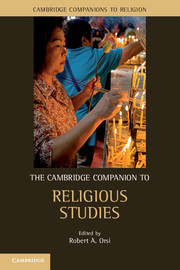Book contents
- Frontmatter
- Introduction
- Part one Religion and religious studies: the irony of inheritance
- Part two Major theoretical problems
- 5 Social order or social chaos
- 6 Tradition: the power of constraint
- 7 The text and the world
- 8 On the role of normativity in religious studies
- 9 Translation
- 10 Material religion
- 11 Theology and the study of religion: a relationship
- Part three Methodological variations
- Index
9 - Translation
from Part two - Major theoretical problems
Published online by Cambridge University Press: 28 March 2012
- Frontmatter
- Introduction
- Part one Religion and religious studies: the irony of inheritance
- Part two Major theoretical problems
- 5 Social order or social chaos
- 6 Tradition: the power of constraint
- 7 The text and the world
- 8 On the role of normativity in religious studies
- 9 Translation
- 10 Material religion
- 11 Theology and the study of religion: a relationship
- Part three Methodological variations
- Index
Summary
In times of geopolitical conflict, attempts to translate religion are often attempts to heal. After the attacks of September 11, 2001, Muslims in Western nations, as well as U.S. President George W. Bush and other non-Muslim Westerners, engaged strenuously in an effort to translate: “Islam is peace,” or “Islam means peace.” This was not the first attempt to defuse crisis through religious translation. The rise of religious studies as a discipline is intertwined with the belief that this discipline itself could bring about peace through its acts of translation. But this is a myth scholars of religious studies ought to protest strenuously.
The notion that religious studies can avert or relieve social and cultural crises goes back to the early days of the organization of the field in the United States. In his 1949 lecture on “The History of Religion in the Universities,” for example, George F. Thomas, chair of Princeton's Department of Religion at the time, noted that religious studies is a difficult discipline to organize pedagogically, for “our students are now being moved to take our courses in religion not only by intellectual curiosity but also by religious need.” In the context of the Cold War, “the religious and moral confusion of our time and the threat of secularism to our civilization have made it necessary for us to find our way back to the wellsprings of faith that have given meanings to the lives of our fathers.”
- Type
- Chapter
- Information
- The Cambridge Companion to Religious Studies , pp. 186 - 208Publisher: Cambridge University PressPrint publication year: 2011
- 1
- Cited by



